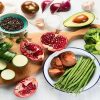
How do Vegans Get Enough Vitamins and Nutrients?
An animal-product-free diet is known as a vegetarian diet. Deciding to become vegetarian is a major one. Changing one’s eating habits is a significant undertaking for most individuals.
Vegetarianism may be adopted for various reasons, including improved health or religious convictions. Using and injuring animals is fraught with ethical dilemmas for some individuals. Concerns about the food industry’s impact on the environment are also valid. Certain religious organizations forbid certain foods. There is a learning curve involved in being a vegetarian, no matter your motivations. You’ll have to change your eating habits and give up some of your favourite foods. Before going out to eat, look at the restaurant’s online menu. Other individuals who share your interests may also be a great source of inspiration.
Improved health is a step on the way.
It’s possible to follow a vegetarian diet in a variety of ways. Consider your own health and religious convictions before making a decision.
Lacto-ovo-vegetarians abstain from eating animal products such as meat, poultry, or seafood. They do consume dairy and eggs.
Lacto-vegetarians abstain from eating any animal products, including meat, poultry, fish, and eggs, in any form. These animals are omnivorous and consume dairy products like yoghurt and cheese regularly.
Ovo-vegetarians do not consume meat, poultry, fish, and dairy products. Eggs are a staple in their diets.
They are not classic vegetarians, termed flexitarians (also known as semi-vegetarians). Despite this, they consume a modest quantity of meat, chicken, fish, and other animal products. It is more frequent for persons with health-related difficulties to go on this diet. Saturated fat and cholesterol consumption may be reduced by using a flexitarian approach to food selection. Additionally, it aids in boosting your intake of fruits, vegetables, and grains.
They are not vegetarians, but pesco-vegetarians consume fish as part of their diet.
Vegans abstain from eating animal products such as meat, eggs, and dairy. Gelatin and honey are examples of animal byproducts.
It may be challenging to follow a vegetarian diet, but the effort may be worthwhile. Benefits of a vegetarian diet include:
- Maintain a healthy cholesterol level
- Blood pressure may be reduced.
- Saturated fat consumption should be reduced.
Type 2 diabetes, heart disease, and several malignancies are all reduced.
Weighing more healthfully
Vegetarianism is more than just avoiding meat. Like everyone else, vegetarians need to ensure they’re getting enough nutrients from their diets. It’s important to know that not all fruits and veggies are made equal for nutrition. Animal products include nutrients that can’t be obtained in other foods. You must meticulously arrange your meals. This prevents malnutrition and allows you to have a healthy life.
Make sure you’re getting enough of these vitamins and minerals every day:

IRON
The formation of red blood cells relies heavily on iron. This cell type aids in the transportation of oxygen throughout the body. A variety of plant-based foods are excellent providers of iron. Cereals that have been fortified with iron are an excellent source. Non-meat sources of iron are more difficult to absorb. Vitamin C-rich foods, such as oranges and broccoli, should be consumed regularly. These may improve your body’s capacity to absorb iron.
PROTEIN
Almost every component of your body needs protein as nutrition. Skin, bones, muscles and organs are protected by it. Eggs are an excellent source of protein for ovo-vegetarians. Nuts, peanut butter, seeds, grains, and legumes are acceptable vegan substitutes. Non-animal sources of protein include tofu and soymilk. Vegetarians need to make sure they’re receiving enough “complete protein” Amino acids are the building blocks of protein. These are good for your body’s ability to burn calories. All of the essential amino acids are present in a complete protein. Certain meals may be combined to provide a full protein source. Rice and beans, for example, or maize and beans.
CALCIUM
Strengthening and preventing osteoporosis are two of the benefits of calcium. As a result of this condition, your bones become brittle and prone to breaking. Dairy products are the major calcium supply for many individuals. Soybeans and almonds are suitable for a vegan diet. Kale, collard greens, and bok choy are wonderful alternatives for dark leafy greens. Fortified soy milk and juices are also available. There are additional calcium supplements on the market.
VITAMIN
Additionally, vitamin D is critical to bone health. It aids in calcium absorption and bone formation. When exposed to sunshine, your body creates a little amount of vitamin D. It is recommended that you acquire 10 minutes of sunlight exposure three to four times a week, if feasible. This amount of vitamin D should be enough for your needs, based on your residence. Safe procedures in the sun are essential. Drinking cow’s milk or purchasing fortified goods is an excellent way to get additional vitamin D if you’re lacking. Soymilk, rice milk, and a few grains are all included here.
VITAMIN B12
A deficiency of vitamin B12 may lead to anaemia. Those who are Lacto-ovo vegetarians or vegans may acquire this from dairy or eggs. Try to find items with this vitamin added if you’re a vegan. Soymilk and several bowls of cereal are included in this. Consult your physician before beginning a vitamin B12 supplementation regimen.
ZINC
The immune system relies on zinc to function properly. Zinc is found in several slices of cheese. Soy products, beans, and nuts also contain it.
OMEGA 3FATTY ACID
Taking omega-3 fatty acids may boost your cardiovascular health and cognitive abilities. Food sources such as flaxseed meals and oil are excellent. You may also seek plant-based omega-3 supplements in food items. Discuss the benefits of an omega-3 supplement with your doctor. Vegans should check the label for fish oil before purchasing.
Considerations to make
You will get used to a vegetarian diet over time. You’ll be able to try new meals then. Your health may be improved with this diet. This, however, needs careful consideration. Make an effort to avoid eating junk food. High-quality meals with the nutrients your body needs should be part of your diet. Signs of dietary deficiencies should be monitored. Weight, skin, and hair changes are all included here.
Consult your primary care physician if you have any questions or concerns. Consult your doctor before embarking on a new diet, especially if you have a medical condition like diabetes. They can assist you in making the finest dietary decisions for your health.




